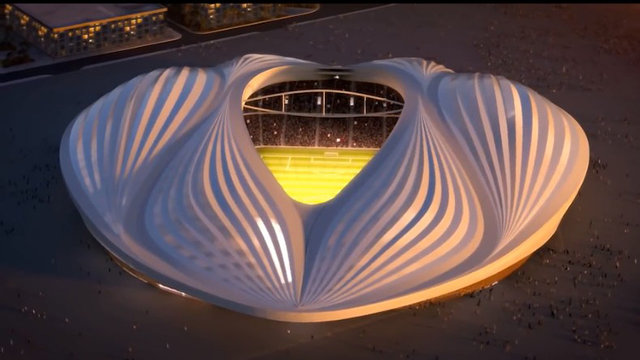Submitted by WA Contents
Weapons, Bribes, And Dictators: Where Architects Draw The Line
United Kingdom Architecture News - May 02, 2014 - 12:28 2670 views

Zaha Hadid says it's not her job to pay attention to how many migrant workers die in the construction of her world cup stadium.FastCoDesign asked four top architects-Bjarke Ingels, Liz Diller, Clive WIilkinson, and Curtis Fentress-How Morality Fits Into The Process Of Accepting Or Rejecting A Commission.
Earlier this year, Zaha Hadid kicked up a firestorm by saying that huge numbers of worker deaths in Qatar-where the renowned architect has designed the Al-Wakrah stadium for the 2022 World Cup-are not her responsibility. The International Trade Union Confederation estimates that 4,000 migrant workers will die in the construction boom leading up to the World Cup due to horrendous working conditions. “I’m not taking it lightly but I think it's for the government to look to take care of,” Hadid said. “It's not my duty as an architect to look at it.”
Hadid's assessment of the situation was pragmatic. She has little control over Qatar's kafala process, a sponsorship system that ties migrants' visa and legal status to their employer and has been likened to a form of slavery. But designing a structure that will be built within that system, where hundreds of workers have died in the past two years, is a loaded proposition.

Al-Wakrah Stadium by Zaha Hadid Courtesy of Neoscape
Architecture does not exist in a vacuum. Moral ambiguities can arise at every stage of the building process-from who you’re willing to take on as a client, to what kinds of structures you’re designing, to who will actually build it (and under what conditions). Would you build for a dictator? Would you design a prison? Would you build in a country that has exploitative labor laws?
Co.Design asked several architects, “Where is your moral line?” Here’s what they had to say about their view on how moral and ethical duty fits into the field.
CLIVE WILKINSON, CLIVE WILKINSON ARCHITECTS
The Los Angeles-based Wilkinson says his firm considers every project in the context of the community around it. "We feel if it’s not making a positive effect on the community, it needs to be reconsidered," he says. "We’ve been invited into projects abroad where we had to say to ourselves: 'Does this make a positive contribution to the local community?'"....Continue Reading
> via FastCoDesign
